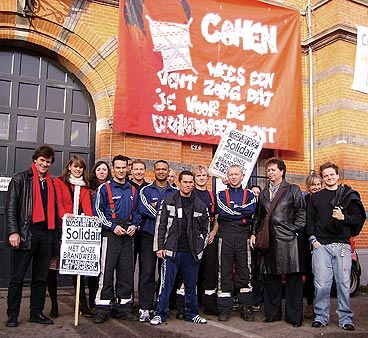Back in March-April 2003, when it looked like the US/UK coalition had won the war on Iraq relatively quick and easy, there were well justified fears that the Bush regime would take this easy victory as an incentive to go on other adventures in the region. At the time it looked like Syria would be the next target, with Iran a close second. Fortunately, the US “victory” quickly turned into a quagmire and the threat of further attacks receded into the background. However, we might have been too complacent in assuming that with the greater part of its army stuck in Iraq the US would be unable to indulge in further adventurism, as Ken MacLeod makes clear.
The war drums have certainly not been silent this past year, with threats against Iran coming not just from the US, but also from its pilot fish in the Middle East, Israel, with both nations making noises about taking out Iran’s alleged nuclear weapons program. The situation is not helped by Iran’s new president and his rather stupid remarks about Israel.
It is probably true that Iran is in pursuit of an a-bomb of its own; it only makes sense, what with Iraq next door as the perfect example of what happens to annoying countries without nuclear weapons, not to mention the threat of the Israeli atomics. However, Iran’s nuclear program is as much excuse as it would be reason for any US attacks. If Bush attacks Iran, it is as it was with Iraq, because he had wanted to do so from the start.
The question now is not does the US want to attack Iran, but can it? At first glance, it looks unlikely, what with the massive overstretch the US army find itself in in Iraq, but then again, it’s the army that’s overstretched, much less so the US navy and airforce. The US does not necessarily need to invade Iran to get what it wants; a series of well chosen airstrikes may do. Especially when the option to make those strikes nuclear is on the table…
Drawing Iran into the war might actually alleviate the US’ troubles in Iraq. Rightly or wrongly, the US thinks Iran, as well as Syria, is behind much of the resistance against the Occupation. In the best possible case for the US, military action or the threat of military action would lead to the overthrow of the Ayatollahs’ regime in Iran and the subsequent collapse of much of the resistance in Iraq, as well as keep any other troublesome Middle Eastern country nice and fearful. In one fell swoop, the fortunes of the US would’ve been transformed from near-failure into succes.
It is a strategy the Americans have used before, in Vietnam. When the US became involved in what was until then a relatively straightforward war of national liberation, the US took the deliberate step of first drawing North Vietnam into the war and when that did not solve its troubles, by extending the war into Laos and Cambodia. Though the US still lost Vietnam, as well as Cambodia and Laos, it succeeded in so far that it kept its other client states — Thailand, Taiwan, Indonesia, South Korea — under control, kept the dominos from falling and kept its loss from being Vietnam’s win, as the country was left devastated by the war.
Of course, the chance that everything will actually work out in the US’ favour if it would attack Iran are vanishingly small and rational sane people would never take that chance, but the people in charge of the US at the moment are far from rational and sane. For Bush and co, the clock is ticking; with now only two more years before the next presidential elections, this might be the last best throw of the dice. In their view, even a slim chance might be better than just muddling through.


